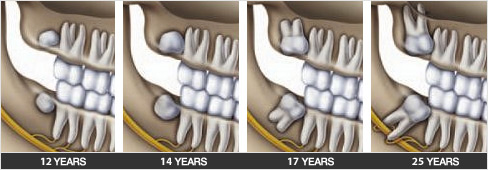The normally wisdom teeth appear between 17 and 25 years of age



The growth of wisdom teeth

The third molars
Also known as wisdom teeth, they are the last teeth to appear. Anthropologists have noted that the abrasive diet of men in the beginning of history caused excessive wear on their teeth. The displacement of the worn teeth allowed for the wisdom teeth to grow.
Today, as a result of a more refined diet and orthodontic treatments, our teeth occupy all the available space and leave little room for growth of the third molars. There is only partial growth or inclusion of the wisdom tooth which could eventually cause problems.
What is an impacted tooth?
A tooth becomes impacted when the surrounding space is insufficient because of the presence of gums or the bone from another tooth.
Is this serious?
Impacted teeth can be painful and result in different degrees of infection. The adjacent teeth can sustain damage from gum disease or cavities. More serious problems can occur when the sac surrounding the impacted tooth becomes infected and a cyst develops.
When a cyst develops, it can result in damage to the bone, the teeth and the nerves. In rare cases, if a cyst is not treated, it will transform into a lesion that will require more complex treatment.
Should I have my wisdom teeth extracted even if I have no symptoms?
Some problems associated with wisdom teeth are not visible or painful. As the wisdom teeth grow, the roots lengthen making extraction more difficult and increasing the risk of complications. Moreover, problematic conditions increase with age. It is difficult to accurately predict whether wisdom teeth will become a problem, but when they do, conditions are more likely to become symptomatic and are sometimes harder to treat. It is estimated that approximately 90% of wisdom teeth will eventually require extraction.
When is the best time to extract the teeth?
Extraction of the third molars is generally easier in young patients because they are not fully formed and the bone around the teeth is more pliable. In addition, there is less risk of damaging surrounding structures such as the nerves, the maxillary sinus and adjacent teeth. Extractions can be more complex at a later age. Root development may involve the nerve that gives feeling to the chin and lip. The jaw is denser and the extraction is more complex.
Waiting until your teeth are causing you discomfort is not recommended. In general, healing is faster and convalescence is simpler when extractions are performed at a younger age. Studies show that wisdom teeth should be removed at a young age. This will prevent both dental and gum problems.
Research shows that older patients run a greater risk of developing periodontal (gum) disease around the wisdom teeth areas. Periodontal disease can lead to general health problems.
What happens during the operation?
Your oral surgeon will discuss your case with you during your appointment. He will review your medical history, medications and allergies. He will examine you, review your x-rays and explain why the extractions are necessary or unnecessary. The risks and benefits will also be discussed. After this, a surgery date will be chosen based on your needs and convalescence.
What happens AFTER the operation?
After the operation, you will need to convalesce. There may be swelling and discomfort. Applying cold compresses will reduce swelling. You will be given a prescription for pain relievers and antibiotics. We recommend a soft diet in the days following the surgery and you will gradually be able to chew solid food.
